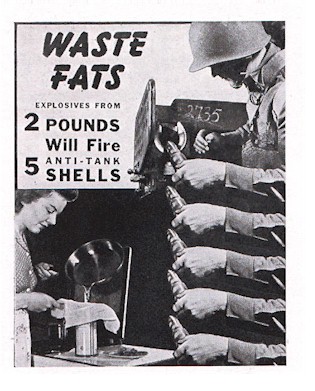
You girls have been asking for it haven't you (A war
job, we mean.) Well, here it is...one for the duration...greasing
the skids for Hitler and the Japanese with the grease right out of your
own kitchens.
So get yourself a pound size tin can...one with a wide mouth (the
kind your vegetable shortening on your coffee comes in is
perfect.) Scrub it out so it's clean. Put it on the back of
the stove where it's handy and warn the rest of the family, "Hands
off! This is for grease salvage."
For grease salvage is your job... saving as much as you can of two
billion pounds of grease which ordinarily go down the drain or out with
the garbage. When the Japanese took the Phillippines and Malaya
and the Dutch East Indies, they also took away from us a good half of
our imports of fats and oils. We needed those fats and
oils.....badly.
We needed them for food, and for paints and varnishes for planes, and
tanks and guns and ships. We needed them, too, for glycerine...not
to make a sweet smelling hand lotion, but for explosives and gun powders
and for medications.
With the greases ordinarily wasted in the kitchen, you can help, if
you will, to make up in part for the loss of these imports. That's
why your Government is asking you to start right now to save every tiny
drop of grease from roast ham, beef, lamb and poultry; all the drippings
from broiled teaks, chops, veal and bacon; every ounce of lard or
vegetable shortening in which you've cooked the doughnuts or the French
fries or the fish or anything else you fry in deep fat. (Of
course, you're not expected to relinquish this deep fat until you've
used it as many times as you wish.)
Strain these fats into your wide mouthed tin can. Keep the can
in your refrigerator or some other cool place until you've collected at
least a pound of grease. Be sure it doesn't grow rancid because
then the glycerine content will be lessened.
When you have a pound or more of grease, take it to your meat
dealer. He has been ready for your supply since July 6 and he will
pay you for it and start it on its patriotic way to our war
industries. (By the way, try not to take it on week-ends, because
that's your butcher's busiest time.)
Saving kitchen grease isn't a very exciting job. But the Nazis
have been doing it every since the war began because they know how
valuable it is to their war plans - their plans to beat us - and they
think they will. In a pig's eye, they will. Our women know
how to fight war, even over a kitchen stove.
|